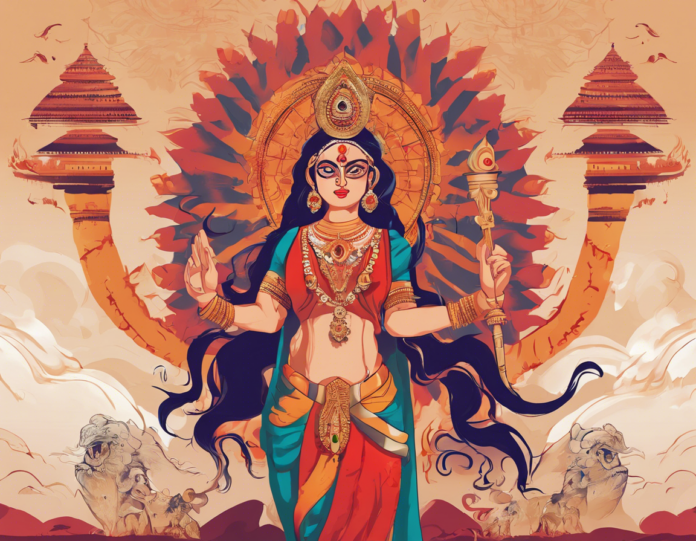In the vast and intricate tapestry of Hindu philosophy and ethics, the concept of Dharma holds a paramount position. Dharma is a Sanskrit term that embodies various meanings such as duty, righteousness, moral law, and virtuous living. The ancient scriptures of Hinduism – the Vedas, Upanishads, Bhagavad Gita, and the epics like Ramayana and Mahabharata – extensively discuss the importance of upholding Dharma in one’s life. The phrase “Dharmo Rakshati Rakshitah” encapsulates this significance, translating to ‘One who upholds Dharma is protected by Dharma itself.’
The Essence of Dharma:
Dharma is a foundational concept in Hinduism, dictating moral and ethical principles that govern individual conduct and societal harmony. It is not just a set of rules or commandments but an all-encompassing guide to righteous living. Upholding Dharma involves understanding and fulfilling one’s duties and responsibilities in various roles – as a student, householder, parent, or citizen.
Types of Dharma:
-
Rita Dharma: The cosmic order and universal law that maintains harmony and balance in the world.
-
Samaanya Dharma: General duties and ethical principles applicable to all individuals irrespective of their varna (caste) or ashrama (stage of life).
-
Vishesha Dharma: Specific duties based on one’s varna and ashrama, emphasizing specialized guidelines for each social category and stage of life.
Importance of Upholding Dharma:
-
Personal Growth and Fulfillment: Adhering to Dharma leads to inner growth, self-discipline, and spiritual evolution, enabling individuals to realize their true potential.
-
Social Harmony: Upholding Dharma fosters goodwill, compassion, and respect in relationships, promoting a cohesive and thriving society.
-
Karma and Rebirth: Observing Dharma is pivotal for accumulating positive karma, which influences one’s future births and ultimate spiritual liberation (moksha).
-
Divine Approval: Following Dharma pleases the Devas (celestial beings) and earns their blessings, ensuring protection and prosperity in one’s life.
Duties and Responsibilities According to Dharma:
-
Duties towards Self: Self-discipline, self-improvement, practicing non-violence (ahimsa), and pursuing knowledge to enhance personal growth.
-
Duties towards Family: Providing for and protecting one’s family members, respecting elders, nurturing children, and upholding familial traditions.
-
Duties towards Society: Contributing positively to the community, upholding justice, helping those in need, and promoting social welfare.
Challenges in Upholding Dharma:
-
Modernization: The rapid pace of modern life often conflicts with traditional Dharma principles, leading to ethical dilemmas and moral ambiguity.
-
Individualism: Contemporary emphasis on individual freedoms and choices sometimes undermines collective welfare and societal duties prescribed by Dharma.
-
Secularism: In a secular world, balancing religious injunctions with universal ethics and legal frameworks poses challenges in interpreting and implementing Dharma.
FAQs – Frequently Asked Questions:
Q1: Is Dharma limited to Hinduism only?
A: While the concept of Dharma is deeply rooted in Hinduism, similar ideas of moral duty and righteousness exist in other Indian religions like Buddhism, Jainism, and Sikhism.
Q2: Can Dharma be adapted to contemporary times?
A: Yes, Dharma is adaptable and timeless, allowing for reinterpretation to suit changing social norms and contexts while maintaining its core ethical values.
Q3: How can one determine their specific duties according to Dharma?
A: Understanding one’s varna (caste) and ashrama (stage of life), seeking guidance from scriptures and wise mentors, and reflecting on personal strengths and responsibilities can help in discerning specific duties.
Q4: What happens when there is a conflict between different Dharmas?
A: In cases of conflicting duties, one should prioritize based on the situation, weighing the consequences and potential impacts on individuals and society to make a conscientious decision.
Q5: Is Dharma synonymous with religious rituals and practices?
A: While Dharma encompasses religious duties and observances, it extends beyond mere rituals to include ethical conduct, social responsibilities, and spiritual growth.
In essence, upholding Dharma is not just a moral obligation but a pathway to self-realization, societal well-being, and spiritual harmony. Embracing the timeless wisdom of Dharma can guide individuals towards leading a purposeful and virtuous life, in alignment with the cosmic order and divine principles of righteousness.












